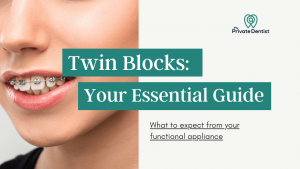Root canal treatment can take 60 to 90 minutes to complete. It is often done over one or two visits, though can be more. Factors affecting it include complex root anatomy, or teeth that remain symptomatic due to long-standing infection.
Has your dentist told you that you need a root canal? Don’t worry: root canal is generally a painless procedure that clears an infection from a tooth, preventing the need for an extraction.
As a dentist, I’m frequently asked “How long does a root canal take?” This is usually followed by questions about what root canal treatment involves, and if it will be painful. If you’re nervous about having root canal treatment, you may find read it helpful to find my answers to the most common questions about root canal treatment.
When is a root canal treatment needed?
Root canal treatment is needed if there is infection of the dental pulp: the centre of the tooth that houses the nerves and blood supply. If a tooth has been has been damaged (by tooth decay or trauma), bacteria can seep in and infect the pulp tissue. Though not always, an infected tooth can be very painful. Over time, you may also develop swelling, or an abscess, on your gum.
A dentist will carry out a full assessment; considering your symptoms, special tests and x-rays, before deciding whether your tooth is suitable for root canal treatment. An alternative option to treat infection of dental pulp is an extraction.
What is a root canal treatment?
A root canal treatment is a dental procedure in which the infected pulp tissue of a tooth is removed. Small files are introduced to remove the infected/necrotic pulp tissue, and a mild bleach is used to kill the bacteria.
Once the tooth is symptom free, the dentist will fill and seal the root canals to prevent them getting re-infected.
What happens if I don’t have a root canal treatment?
An infection in your tooth will not go away on its own. If left untreated, the bacterial infection can spread to other areas of your mouth. You may develop an abscess, a pus filled bubble next to your tooth. Over time, an infection can cause a large swelling which could be dangerous if it blocks your airways, making it difficult to breathe.
If you don’t have root canal treatment, you could have an extraction instead. If you want to keep your tooth, don’t delay having a root canal for a higher chance of the treatment being successful. Long standing infections in a tooth may not respond well to root canal treatment, and may need to be removed.
How long does a root canal take?
The average root canal treatment usually takes around 60 to 90 minutes to complete.
However, there are some factors to consider:
Which tooth needs a root canal: Your front teeth, or incisors, are usually the quickest to treat with a root canal. They generally have simpler anatomy and one single root. A premolar can have two canals and therefore take longer to clean.Your back teeth, or molars, usually take longest to root canal. They have the most complex root anatomy, with 3 or 4 canals, and so can be more challenging to treat.

How infected the tooth is: A tooth which contains more bacteria, or has been infected longer, will take more time to clean out.
Age: Root canal treatments can be more complex in older patients, as the root canals become more narrow and more difficult to clean.
The skill of the dentist: Some dentists have extra training to specialise in root canal treatments. They may have additional equipment, such as microscopes, which help them to carry out root canal treatment more efficiently.
How many dental visits are needed for a root canal treatment?
A root canal usually takes either one or two visits to the dentist:
One visit: If the root canals are simple to find and clean, they may be filled on the same visit.
Two visits: If your root canals are difficult to navigate, or if you have a long standing infection, your root canal may require an additional visit. A dressing is placed into the canals, and then a temporary filling. This is usually left in for two weeks to help disinfect the tooth. The root canals are then filled on the second visit.
Two additional visits if you need a crown: It is common to fit a crown following root canal treatment, especially on back teeth. It generally takes 60 mins to prepare a tooth, and then 30 mins to fit.
What is the process of root canal treatment?

Introduction: A dentist will discuss the procedure, and seek to gain informed consent. They will also give you an idea of what to expect and time scale.
Local Anaesthetic: To ensure the procedure is pain free, you will be offered local anaesthetic. Usually 1 or 2 injections are delivered next to your tooth to numb the area. Anaesthesia should last the duration of your appointment, up to 2-3 hours, though can be topped up if necessary
Rubber dam: A thin sheet of rubber latex is placed around the tooth, often kept in position with a small metal clamp. The dentist uses this for:
- Keeping the area around the tooth clear and dry
- Helping to keep your mouth open
- Prevents inhaling or swallowing root canal disinfectants/instruments
- Allows safe use of files
Access the tooth: The tooth is cleared of any tooth decay, and the root canals are found
Cleaning and shaping: Small files are introduced in each canal within the tooth. They are carefully shaped and cleaned to remove the nerve and pulp tissue. Irrigating liquid is then used to dissolve and flush out any bacteria left behind.
Temporise or Finish?: Here is where the dentist will make a decision of whether the canals are clean enough to be filled.
- Yes, clean enough – The canals can be sealed and filled, and the procedure is complete.
- No, need further cleaning – Medication will be put into the canals to help the disinfection process and a temporary filling is placed. A second visit will be needed to clean and finish the treatment.
Does root canal treatment hurt?
With adequate anaesthesia a root canal should be painless, and feel similar to having a filling.
In some cases, patients experience a ‘hot pulp’. In these instances, the nerve is particularly inflamed and anaesthetic may not be as effective. It is important to inform your dentist if you’re experiencing discomfort, so they can deliver more local anaesthetic within the tooth once accessed.
Do I need to take medicine before my root canal treatment?
Painkillers: Some dentists advise taking Ibuprofen(anti-inflammatory) before root canal treatment. This can help to reduce swelling and pain post treatment. Only take this if you have no medical contraindications to anti-inflammatory drugs. If you are unsure, contact your doctor.
Regular Medication: You should take all regular medications as normal before your procedure.
Can I eat before my root canal treatment?
Yes. Make sure you have eaten before your appointment.
If you have had local anaesthetic, it may be 2-3 hours before numbness wears off. If a temporary filling is placed, you should wait at least 30 minutes to allow it to set before eating.
Will I need a crown after root canal treatment?
It is advisable to have a crown fit on a tooth that has been root treated. This helps to protect the tooth, and prevent it from fracture.
Accessing the canals requires drilling into the centre of the tooth, which leaves it more hollow and prone to fracture. A crown helps to protect the whole tooth structure from collapsing.
Healthy nerves inside teeth give us feedback on how hard we are biting. After having a root treatment, the lack of feedback makes it more likely to bite too hard on a tooth, leading to a fracture.
Are there any alternatives to root canal treatment?
The only alternative to having an infected tooth root canal treatment is to have the infected tooth extracted (Read more about root canal vs extraction). The tooth would can then be replaced with either a denture, bridge or implant.
Can I take antibiotics for a root canal infection?
No. Sometimes antibiotics are given if you have an infected tooth with a large swelling, which is making you feel unwell. This is a short term solution to help settle the infection, but will not clear it altogether. The tooth will still need either Root Canal Treatment or an extraction.
How much do root canal treatments cost?
The cost for root canal treatment can vary from £350-£800. A molar root canal usually costs more than a premolar or incisor. Specialists, who often deal with more complex cases, are at the higher end of the price range. Treatment carried out under sedation is likely to cost more. (Read more about root canal cost)
Does my root canal treatment need to be done by a specialist?
Not in all cases: It depends on the complexity of the root canal. Simple straight forward root treatments can be carried out by general dentists. Root canals should be done by a specialist if:
- The root anatomy is complex – a curve or extra roots
- The root treatment needs to be done through a crown or bridge
- The tooth has had a previous failed root treatment.
Your dentist will be able to tell you if your tooth may be difficult to root treat, and would benefit from specialist treatment.
Does it hurt after a root canal treatment?
After root canal treatment, you should expect some mild discomfort for up 1-2 weeks. Cnce the numbness wears off. you may experience soreness from your mouth being held open for a long period of time, or from the injection site.
Generally, recovery after root canal is quick and your tooth should be pain free. The irritated nerve is removed and infection treated, so painful symptoms will disappear.
I’m having problems after root canal treatment. Should I contact my dentist?
In some cases, problems may occur mid way or after root canal treatment. You should see your dentist if:
- The pain from your tooth is keeping you up at night.
- You develop a large swelling.
- The temporary filling is damaged or lost.
What should I avoid after root canal treatment?
Eating: Avoid eating or hot drinks until numbness from anaesthetic has worn off (can take 2-3 hours). This will also give time for filings to harden. If you have a temporary filling, avoid sticky or chewy foods as they may cause damage.
Smoking: You should avoid smoking as this can slow down the healing process.
Work: Avoid strenuous work if possible, but no direct contraindication to exercise as there may be with a dental extraction.
How do I know a root canal treatment has worked?
If root canal treatment has been successful, you should no longer be experiencing pain from your tooth. Although some mild discomfort can be expected for up 1-2 weeks after treatment, you should feel considerably better. Any swelling or bad taste in your mouth should subside, and you should be able to eat comfortably on the tooth.
Severe pain that lingers could be a sign of root canal failure.
How long will my tooth last after root canal treatment?
In 90% of cases, a root canal treated tooth is still successful 8-10 years following treatment [1]. If a root canal treated tooth is properly cleaned, sealed and protected it can last a lifetime. Putting a crown on a root canal treated tooth helps to protect it . You must ensure you brush well and floss regularly around the tooth, in order to maintain it.
What are the symptoms of a failed root canal?
Though most root canal treatment is successful, there is a chance that complications can occur and treatment can fail. Failure of a root canal may need re-treatment. Root canal treatment may have failed if symptoms don’t improve or if they worsen. Symptoms to look out for include:
- Swelling around the tooth or on the side of the face
- Pain on biting
- Constant dull ache
- An abscess on the gum (looks like a small bubble). May have a pus discharge.
If you are experiencing these symptoms following root canal treatment, visit your dentist for advice and treatment.
When should I see my dentist?
If you’re having persistent pain from a tooth it is important to see your dentist as soon as possible. Severe pain could be a sign that you need a root canal treatment.
Other signs of an infected tooth that needs a root canal:
- Prolonged sensitivity to hot and cold
- Pain on biting
- Pain disturbing sleep
- Facial swelling
- Swelling or abscess developing on your gum
- Large cavity in tooth trapping food and plaque
- Chipped or cracked tooth
- Grey/black discolouration following a knock or bang to the tooth
If you’re suffering from any of these issues, find a dentist who can check your symptoms, and diagnose your problem. We have many dentists listed on My Private Dentist, including Root Canal Specialists (Endodontists).



